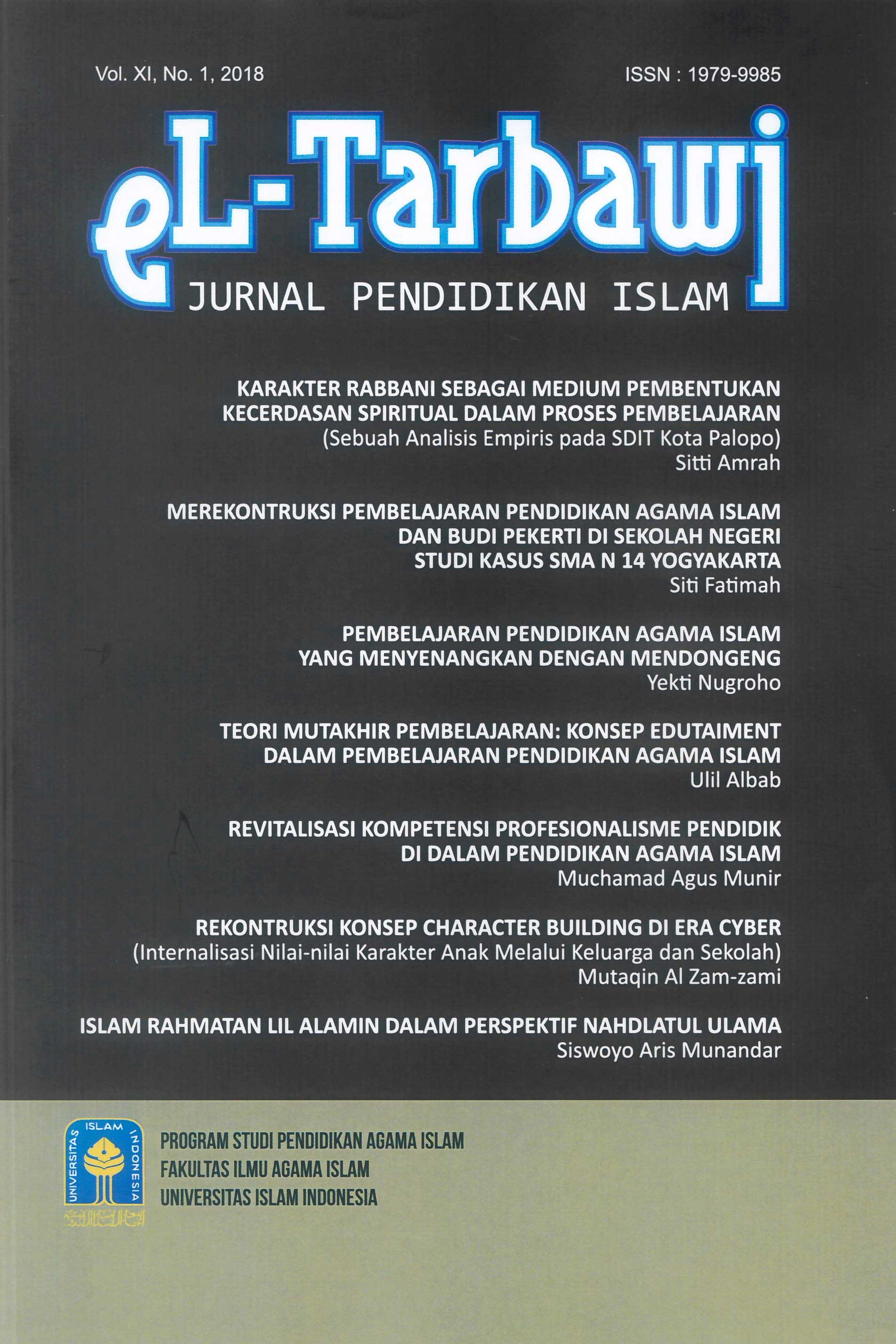Main Article Content
Abstract
Great depression in 1930s and multidimensional crisis aftermath inspired some scholars to propose the idea of a new social order. Those scholars, the reconstructionist, see that it is necessary for human beings and humanity in order to survive the challenges to reconstruct their way of life: setting aside negative impacts of modernity while maintaining the good aspects. The reconstructionist see that education must play a role in building new social order by being involved in social movement and reconstruct the way of learning and teaching. In the context of learning PAI (islamic teachings educations) and morals in government schools, SMA N 4 Yogyakarta has adapted several methods relevant to the ideas of reconstructionism in education. SMA N 4 Yogyakarta has made use of cyber media as a way to develop students’ understanding about materials. This school also encouraged students to be involved in community development.
Keywords: reconstructionism, islamic education, PAI.
Article Details
Authors retain copyright and grant the journal right of first publication with the work simultaneously licensed under a Creative Commons Attribution (CC-BY-SA) 4.0 License that allows others to share the work with an acknowledgment of the work’s authorship and initial publication in this journal.
References
- Assegaf, Abd. Rachman. (2014). Filsafat Pendidikan Islam, Jakarta: Raja Grafindo Persada.
- Haris, Abdul. (2014). Aliran Rekonstruksionisme dalam Pandangan Filsafat Pendidikan Islam, makalah dipresentasikan dalam Program Pasca Sarjana, STAIN Pekalongan.
- Hamruni. (2014). Pembelajaran Berbasis Edutainment, Yogyakarta: Investidaya.
- Jalaluddin dan Idi, Abdullah. (1997). Filsafat Pendidikan: Manusia, Filsafat dan Pendidikan, Jakarta: Gaya Media Pratama.
- Knight, George R. (2007). Filsafat Pendidikan, penerjemah: Mahmud Arif, Yogyakarta: Gama Media.
- Kristiawan, Muhammad. (2016) Filsafat Pendidikan: The Choice is Yours, Yogyakarta: Valia Pustaka.
- Muhmidayeli. (2011). Filsafat Pendidikan, Bandung: Refika Aditama.
- Noor, Wahyudin. (2014). Rekonstruksi Pendidikan Agama Islam. Jurnal Qathruna, Vol. 1 No. 1, 40-59.
- Rahmayana, Jeeny. (2015). Filsafat Rekonstruksionisme dalam Pendidikan Islam Studi atas Pemikiran Muhammad Iqbal. Jurnal Tamaddun Ummah, Vol. 1, No. 1, 1-13.
- Suroto. (2013). Rekonstruksi Pendidikan Islam sebagai Paradigma Alternatif Pendidikan di Indonesia. Al-Mabsut, Vol. 6, No. 1, 1-14.
References
Assegaf, Abd. Rachman. (2014). Filsafat Pendidikan Islam, Jakarta: Raja Grafindo Persada.
Haris, Abdul. (2014). Aliran Rekonstruksionisme dalam Pandangan Filsafat Pendidikan Islam, makalah dipresentasikan dalam Program Pasca Sarjana, STAIN Pekalongan.
Hamruni. (2014). Pembelajaran Berbasis Edutainment, Yogyakarta: Investidaya.
Jalaluddin dan Idi, Abdullah. (1997). Filsafat Pendidikan: Manusia, Filsafat dan Pendidikan, Jakarta: Gaya Media Pratama.
Knight, George R. (2007). Filsafat Pendidikan, penerjemah: Mahmud Arif, Yogyakarta: Gama Media.
Kristiawan, Muhammad. (2016) Filsafat Pendidikan: The Choice is Yours, Yogyakarta: Valia Pustaka.
Muhmidayeli. (2011). Filsafat Pendidikan, Bandung: Refika Aditama.
Noor, Wahyudin. (2014). Rekonstruksi Pendidikan Agama Islam. Jurnal Qathruna, Vol. 1 No. 1, 40-59.
Rahmayana, Jeeny. (2015). Filsafat Rekonstruksionisme dalam Pendidikan Islam Studi atas Pemikiran Muhammad Iqbal. Jurnal Tamaddun Ummah, Vol. 1, No. 1, 1-13.
Suroto. (2013). Rekonstruksi Pendidikan Islam sebagai Paradigma Alternatif Pendidikan di Indonesia. Al-Mabsut, Vol. 6, No. 1, 1-14.
